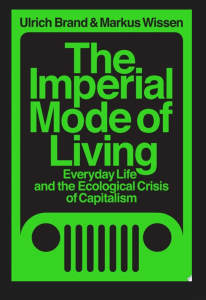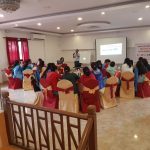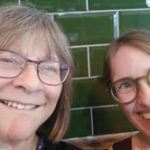
In December’s Socio-Ecological Transition Seminar (SETS), Markus Wissen will present his recent book “The Imperial Mode of Living. Everyday Life and the Ecological Crisis of Capitalism”, co-authored with Ulrich Brand (2021).
Markus is a Professor of Social Sciences at the Berlin School of Economics and Law. His research focuses on Socio-ecological transformation of modes of production and consumption and on the crisis and transformation of society-nature relations.
Short abstract of the book
Our unsustainable life: why we can’t have everything we want
With the concept of the Imperial Mode of Living, Brand and Wissen highlight the fact that capitalism implies uneven development as well as a constant and accelerating universalisation of a Western mode of production and living. The logic of liberal markets since the nineteenth century, and especially since World War II, has been inscribed into everyday practices that are usually unconsciously reproduced. The authors show that they are a main driver of the ecological crisis and economic and political instability.
The Imperial Mode of Living implies that people’s everyday practices, including individual and societal orientations, as well as identities, rely heavily on the unlimited appropriation of resources; a disproportionate claim on global and local ecosystems and sinks; and cheap labour from elsewhere. This availability of commodities is largely organised through the world market, backed by military force and/or the asymmetric relations of forces as they have been inscribed in international institutions. Moreover, the Imperial Mode of Living implies asymmetrical social relations along class, gender and race within the respective countries. Here too, it is driven by the capitalist accumulation imperative, growth-oriented state policies and status consumption. The concrete production conditions of commodities are rendered invisible in the places where the commodities are consumed. The imperialist world order is normalised through the mode of production and living.
The discussion will be opened by two discussants:
Dennis Eversberg (University of Jena). Dennis does research in Political Sociology, the study of social-ecological movements, environmental politics, mentalities and social structure. He currently works on the mental preconditions and consequences of post-fossil transformations, the subjective limits to capitalist growth regimes, the degrowth movement and authoritarian nationalism.
Gustavo García López (Center for Social Studies of the University of Coimbra). Gustavo is an engaged researcher, educator, and apprentice organizer, from the islands of Puerto Rico. His work is situated broadly at the intersection of ecology and the political, but he also cultivates inevitable interests in postcolonial/decolonial, Caribbean, island, Puerto Rican and Latin American studies.
The session will be on Zoom, on December 14th at 3 pm (UK time)
Zoom Meeting joining details:
https://unitn.zoom.us/j/85334570893
Meeting ID: 853 3457 0893
Password: SETS
SETS is a joint initiative between the Research Group on Collective Action, Change, and Transition at the University of Trento, the Centre for Sustainable and Socially Responsible Consumption at Bournemouth University, and the Environmental Sociology Section at the University of Orebro. The seminars are open to a diverse audience, including academics, students, practitioners, social movements, and the non-specialist public.
 SETS seminar – ideas and future collaborations welcome
SETS seminar – ideas and future collaborations welcome










 Up2U: New BU academic publication
Up2U: New BU academic publication New BU midwifery paper
New BU midwifery paper BU academic publishes in online newspaper in Nepal
BU academic publishes in online newspaper in Nepal Final day of the ESRC Festival of Social Science
Final day of the ESRC Festival of Social Science Using Art to enhance Research
Using Art to enhance Research ECR Funding Open Call: Research Culture & Community Grant – Application Deadline Friday 12 December
ECR Funding Open Call: Research Culture & Community Grant – Application Deadline Friday 12 December MSCA Postdoctoral Fellowships 2025 Call
MSCA Postdoctoral Fellowships 2025 Call ERC Advanced Grant 2025 Webinar
ERC Advanced Grant 2025 Webinar Horizon Europe Work Programme 2025 Published
Horizon Europe Work Programme 2025 Published Horizon Europe 2025 Work Programme pre-Published
Horizon Europe 2025 Work Programme pre-Published Update on UKRO services
Update on UKRO services European research project exploring use of ‘virtual twins’ to better manage metabolic associated fatty liver disease
European research project exploring use of ‘virtual twins’ to better manage metabolic associated fatty liver disease